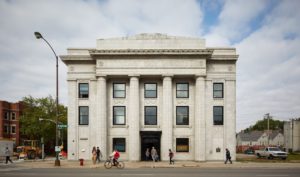Place Lab, a joint enterprise between the University of Chicago’s Arts + Public Life initiative and the Harris School of Public Policy, is working on an evolving set of principles drawn from artist-led, neighborhood-based development work happening on Chicago’s South Side.
By introducing the 9 Principles of Ethical Redevelopment in their early stages of development, it is their intention for the content to be shared and refined collaboratively with other willing urban practitioners who also believe in spatial equity for cities.
Ethical Redevelopment makes the case for mindful city-building. By utilizing cross-city networks and cross-sector innovation, Ethical Redevelopment encapsulates a philosophy by which to shift the value system from conventional, profit-driven development practices to conscientious interventions in the urban context.
Place Lab offers the following example: “An abandoned bank can reopen as a collections and cultural center with highly ambitious programs and exhibitions, set against the backdrop of a stunningly designed, refurbished building (Stony Island Arts Bank). A neighbor can be a programmer (a resident next to Dorchester Projects is on the Black Cinema House Advisory Board). The window from one building can live again as the walls/partitions of another (BING Art Books). A defunct currency exchange, a financial center for patrons who do not use traditional banks, can be repurposed into a well designed café that serves food both indigenous and foreign to local populations, encouraging a different kind of exchange (Currency Exchange Café).”
It is articulated by an emerging set of 9 Principles that were drawn from artist-led, neighborhood-based development work on Chicago’s South Side. Place Lab has now introduced the 9 Principles in their early stages of development in order to share and refine with other willing urban practitioners who believe in spatial equity for cities.
“Ethical redevelopment is the reimagining of space and the politics of spatial and social governance with the intention to create new forms of equity, new ways of encouraging more life in a place. Simply said, it’s ensuring that beauty remains high in the hierarchy of human rights,” says social practice installation artist Theaster Gates.
Place Lab’s working definition of Ethical Redevelopment is “Shifting the value system from conventional financial and development practices to conscientious
interventions in the urban context.”
Ethical Redevelopment was refined during a year-long series of Public Convenings and membership-based Salon Sessions. The conversations, case studies, and content generated will be shared in an open online forum and through a culminating publication (see below).
Following the Convening, Place Lab hosted monthly, small, invitation-based Salon Sessions at the Stony Island Arts Bank that worked through each of the 9 Principles of Ethical Redevelopment. The content generated in these Sessions—presentations, video, photos, blogs, and essays—will be shared online in a website and publication.
Photo from a 2017 Ethical Redevelopment salon by Brandon Fields via Place Lab.
See the 9 Principles of Ethical Redevelopment booklet (PDF).


